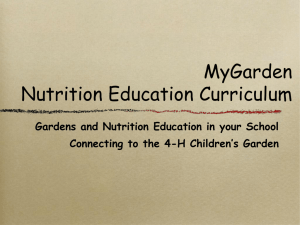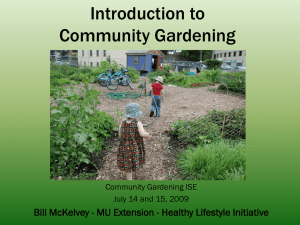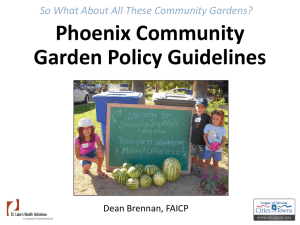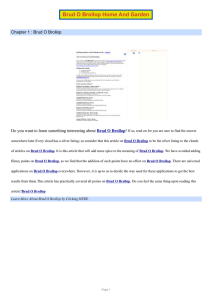Why School Gardens Presentation
advertisement
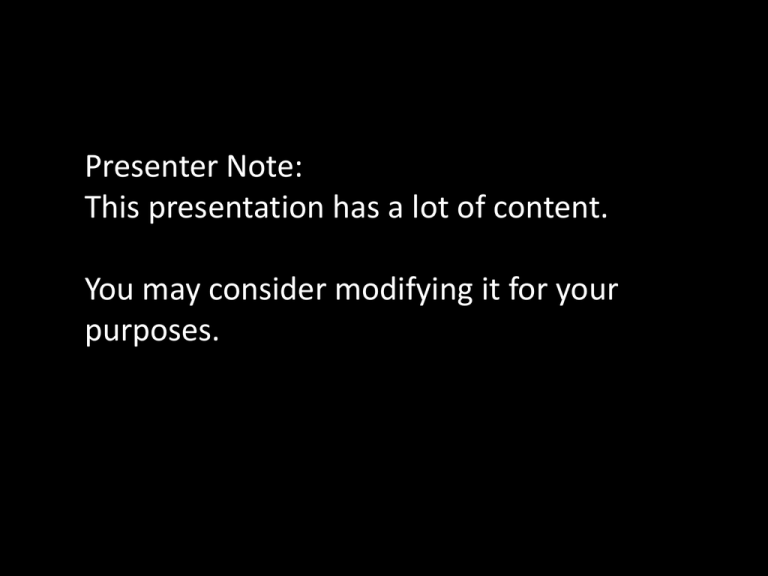
Presenter Note: This presentation has a lot of content. You may consider modifying it for your purposes. CSYSG Workshop Goals • OPTIONAL: Share the goals that you plan to cover during your workshop. • Refer to the list of goals in the notes below. Creating and Sustaining Your School Garden Workshop • Creating and Sustaining Your School Garden Workshop is part of the California School Garden Training Program (CSGT) • The CSGT is funded by the California Department of Food and Agriculture • The CSYSG Workshop Model was developed by Life Lab, UC Davis Children’s Garden Program, and the Resource Conservation District of San Diego. Optional Stuff • Site Information • Trainer Information Why School Gardens ? • Garden Pathways Map It is all fun, but you are learning while you are having fun. – Naomi, 5th Grader CA Gardens are Used as Instructional Tools 88% Use for Academic Instruction 12% Other Uses www.lifelab.org/schoolgardensurvey Core Subject Matter www.lifelab.org/schoolgardensurvey Other ways gardens are used • Survey Slide of other areas that garden are used www.lifelab.org/schoolgardensurvey Teachers Know It Research Shows It 84.3% of teachers exposed to school gardens think gardens help students learn more effectively. (Skelly and Bradley 2000) www.csgn.org/research Students engaged in hands-on gardening lessons showed increased positive attitudes towards content material and learning in general. (Bell 2001; Waliczek 2003) Participants in a school garden program experienced significant gains in overall GPA in math and science. (Murphy 2003) www.csgn.org/research Academic Gains • Studies show that school gardening increased selfesteem, help students develop a sense of ownership and responsibility, help foster relationships with family members, and increase parental involvement. (Alexander, J. & D. Hendren, (1998) www.csgn.org/research I’ve accomplished many aspects from making beds, weeding, transplanting, flipping compost, improving my hard work and work ethic. I’ve developed more skills working as a team player and communicating with others. I’m mainly proud of providing food for my family and getting a chance to help out my community. – Tyree, Garden Youth Program Participant Our students know where their food comes from. Judy Honerkamp 5th Grade Teacher Paso Robles Students at schools that incorporate hands-on gardening into their curriculum demonstrate more concern for and willingness to care for living things. (Eames-Sheavly 1994; Murphy 2003) Proper adolescent nutrition can reduce the risk of overweight, obesity, and diet-related diseases later in life. Therefore, it is essential for the health and wellbeing of children that we find a way to encourage their consumption of fresh fruits and vegetables. (McAleese and Rankin 2007) www.csgn.org/research Obesity Trends* Among U.S. Adults BRFSS, 1990 (*BMI ≥30, or ~ 30 lbs. overweight for 5’ 4” person) www.cdc.gov/obesity/data/trends.html No Data <10% 10%–14% Source: Behavioral Risk Factor Surveillance System, CDC. Obesity Trends* Among U.S. Adults BRFSS, 2000 (*BMI ≥30, or ~ 30 lbs. overweight for 5’ 4” person) www.cdc.gov/obesity/data/trends.html No Data <10% 10%–14% 15%–19% ≥20% Source: Behavioral Risk Factor Surveillance System, CDC. Obesity Trends* Among U.S. Adults BRFSS, 2010 (*BMI ≥30, or ~ 30 lbs. overweight for 5’ 4” person) www.cdc.gov/obesity/data/trends.html No Data <10% 10%–14% 15%–19% 20%–24% 25%–29% ≥30% Obesity Trends* Among U.S. Adults BRFSS, 1990, 2000, 2010 (*BMI 30, or about 30 lbs. overweight for 5’4” person) 2000 1990 2010 www.cdc.gov/obesity/data/trends.html No Data <10% 10%–14% 15%–19% 20%–24% 25%–29% ≥30% Garden-Enhanced Nutrition Education Students who received gardenbased nutrition education were more willing to try vegetables than students who received nutrition education without gardening activities. This changed behavior continued for at least six months after the nutrition education program. (Morris 2002) www.csgn.org/research • School Gardens can be an integral part of Farm to School Programs. www.cafarmtoschool.org $93 of school garden produce sold to the cafeteria. School Gardens Come in all Shapes and Sizes School Gardening & Garden Programs Vary in When and How They Operate When are Gardens Used? www.lifelab.org/schoolgardensurvey Grade Levels That Use CA Gardens www.lifelab.org/schoolgardensurvey Who Teaches in the Garden? www.lifelab.org/schoolgardensurvey Gardens Have Varied Themes and Purposes California School Garden Statewide Survey Results Most Garden Support is Through Non-Paid Staff and Volunteers Non-paid Support Staff Paid Support Staff www.lifelab.org/schoolgardensurvey Who is Responsible for School Garden Programs? www.lifelab.org/schoolgardensurvey Who Maintains Gardens? www.lifelab.org/schoolgardensurvey Who Cares for Gardens over the Summer? www.lifelab.org/schoolgardensurvey How are School Gardens Funded? www.lifelab.org/schoolgardensurvey Regardless of What Size, Shape, or Purpose Your Garden Serves, TEAMWORK! Successful School Gardens Require… Resources to Support Your School Garden Project • Gardens for Learning • CSYSG Workshop Materials at csgn.org/csysg



